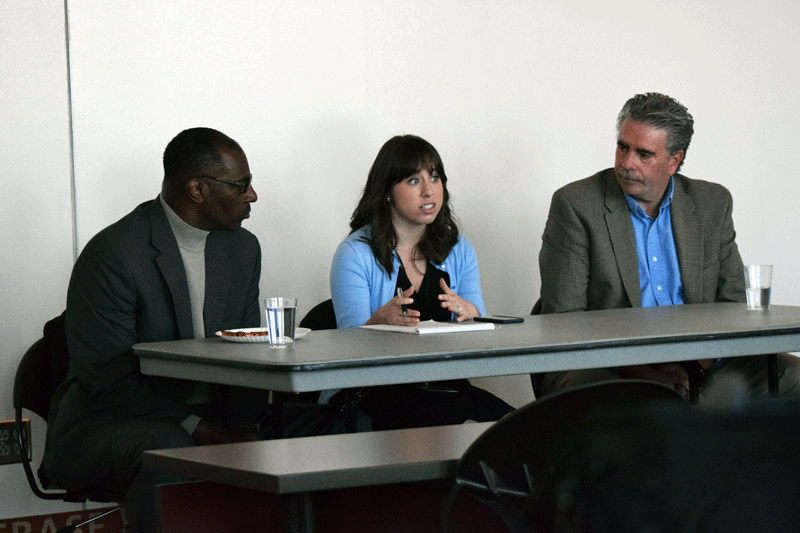Millennials looking for election coverage with an attitude
Local media members spoke to students and staff during the Feb. 29 Lunch with the Pros. Panel members were, from left to right, Courtis Fuller of WLWT, Amanda Seitz of WCPO.com and former reporter Patrick Crowley.
Three local reporters discussed the challenges of gearing coverage of the upcoming presidential election for millennials Feb. 29 to staff and students at Northern Kentucky University.
Courtis Fuller of WLWT, Amanda Seitz of WCPO and former political reporter Patrick Crowley spoke to around 30 people during “Lunch With the Pros.” The event was sponsored by NKU’s Society of Professional Journalists chapter and The Northerner.
The issue at hand is how traditional media outlets are covering the election cycle for a new generation of technologically-savvy voters.
“You guys are so different in how you consume the media,” Seitz said. “Most people who are not millennials are getting it through their traditional news sources. Forty percent of you consume it through social media.”
Because of the nature of social media, Fuller said candidates must constantly be on guard as everything they say and do is immediately broadcasted across the internet.
He specifically cited Donald Trump’s interview with CNN’s Jake Tapper where he struggled with a question regarding the former Grand Wizard of the Ku Klux Klan, David Duke.
“He wasn’t really able to answer this question definitively on whether he should denounce the KKK and the former Grand Wizard of it,” Fuller said. “Years ago, he would have had a window to clear that up before it hit a newspaper or hit the evening news. He had about 30 seconds.”
Crowley spent 27 years as a reporter before joining a public relations firm. He said the tone with which millennials get their news has impacted the tone of the election.
“I still love to read the New York Times,” Crowley said. “I still love reading the Enquirer. My kids get it from different ways. They get it with a little bit of an attitude. I think young people are engaged in this election. This is why you see someone like Bernie Sanders and Donald Trump.”
All of the panelists agreed the millennial generation is fed up with the current state of politics.
“Hillary (Clinton) is getting killed by young people,” Crowley said. “Bernie Sanders got 80 percent of the young vote in Nevada. Your generation is just tired of it. Why can’t we get out of these wars? Why do we keep going in debt? Why can’t congress get along? Why can’t they get along with the president?
“Are Donald Trump and Bernie Sanders the answer? I don’t know. We’ll see.”
Fuller cited Bill Clinton’s appearance on the Arsenio Hall show in 1992 as the turning point for reaching a new audience with a political message. He played his saxophone on the show and set the standard for a new method of reaching voters.
“Barack Obama took this to a whole different level in 2008,” Fuller said. “He was tapping into sources that no one had ever thought about. When you talk about his ‘ground game’ that’s discussed so much, it was an unbelievable campaign in 2008. We’ve seen this progression.”
The progression has continued with advancements in technology that have led to the social media-driven environment present today. It is an opportunity for millennials to get their opinions out to a wider audience than ever before.
“Millennials are able to express their voice on Twitter by retweeting the candidate or sharing their Facebook post,” Seitz said. “Everyone seems like a political expert on Facebook these days. That has become a really empowering tool for millennials to be able to share and interact with this candidate and weigh in.”
Prior to widespread social media, there was a limited outlet for public opinion in mass media.
“If you wanted to get something out there before, you had to write a letter to the editor,” Crowley said. “Good luck with that. There are four of those published a day. They take forever. Now you can get out there immediately and say what you think. Both campaigns – Trump and Bernie – have tapped into that.”
Fuller has seen both sides of a political race. In addition to his journalism career, he unsuccessfully ran for Cincinnati mayor in 2001. He has witnessed a technological revolution first-hand.
“I remember talking to one of my staff members,” Fuller said. “I said, ‘why don’t we, instead of sending out mailers, why don’t I cut a little video and send out a little video message via e-mail?’ He looked at me like I was from Mars. The reason why is nobody had done anything like that.”
The change in the way politicians reach millennials has caused a new type of politician to emerge. Crowley believes it may eventually lead to a true third party by the 2020 election.
“When my daughter left for college in ‘07, I said ‘pay attention to the emergence of a third party because it’s going to happen with technology,’” Crowley said. “Bernie doesn’t sound like the Democratic Party that I grew up with, and Trump sure as hell doesn’t sound like the Republican Party that I’ve been covering in this state for 30 years.”
The “Lunch with the Pros” event was the second of three to be held this semester. The third event this semester will be held at noon April 4, and is regarding a movement called restorative narrative. It seeks to reframe the news to focus on stories of resilience over loss and solutions over problems.


